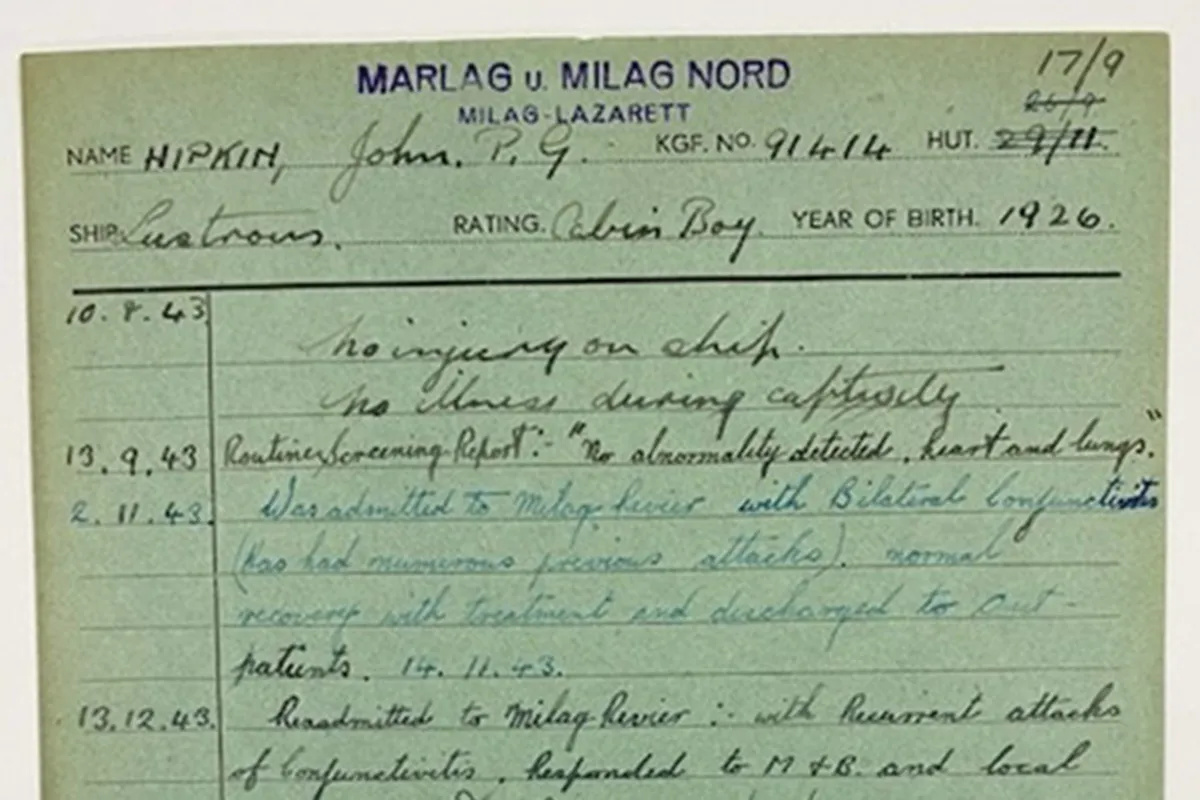New records about Britain’s youngest POW in the Second World War have been opened for the first time at The National Archives.
John Hipkin was born on 29 April 1926 in Byker, Newcastle-on-Tyne and joined the Merchant Navy as a cabin boy when he was 14 because he was too young to join the Royal Navy.
His wartime POW records have been catalogued and are available to the public for the first time.
They show that 21 days into his first wartime voyage, on 22 February 1941, John Hipkin was captured after the oil tanker SS Lustrous was sunk by German battleship Scharnhorst off the coast of Newfoundland.
German POW records show that after being transported back to Europe, John Hipkin and the rest of the crew were taken to Marlag und Milag Nord, a prisoner of war camp primarily for Navy personnel near the German sea port of Bremen.
John was later moved to Stalag XB camp in nearby Sandbostel. The Commandant of Stalag XB, Capt Prusch, was charged with war crimes for mistreating prisoners of war, in contravention of the Geneva Convention 1929.

A UN war crimes commission document available at The National Archives includes a statement by Welsh sea captain LH Lewis who says he saw Commandant Prusch acting “with great brutality to Merchant Navy boys, ages 16 to 18 years, by making them run up and down the parade ground until they dropped to the ground from exhaustion. For trivial offences he forced POWs to stand facing the barbed wire from 6am to 8pm without food or drink in all weathers.”
The British prisoners also shared the camp with prisoners from countries occupied by Germany, including Yugoslavia.
John's son Dominic Hipkin said: “There was an unofficial arrangement with guards that British POWs could share food with the Slavs, who were given very bad mouldy bread. They were told they were allowed to dip it into the British prisoners’ soup, but one guard picked up his rifle while this was going on and shot a young Yugoslav boy right in front of my father. They were the same age.”
John Hipkin was eventually freed on his 19th birthday, 29 April 1945, when a British tank came crashing through the barbed wire fence of his camp. He arrived home on VE day.
His pouch containing his seamen’s records also shows that he was given a disability pension on 11 June 1945 for “effects of detention (hysteria)”. He was discharged from the Merchant Navy on 17 July 1945 at his own request.
Dominic Hipkin said: “Years later records released in 1990 showed that some First World War soldiers who were court-martialled for desertion or cowardice were shellshocked boys who had signed up under age. This triggered my father’s memory of the Yugoslav boy. He started a campaign to have them pardoned.”
Sixteen years later John Hipkin’s Shot at Dawn campaign succeeded with posthumous pardons for 306 “deserters” granted in 2006 on the grounds that many were not given fair trials, not properly defended and some were minors.
The National Archives is currently holding 'Great Escapes', an exhibition about prisoners of war and civilian internees in the Second World War, which runs until 21 July.

